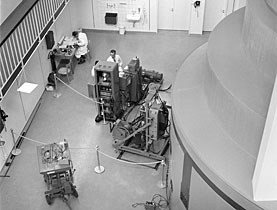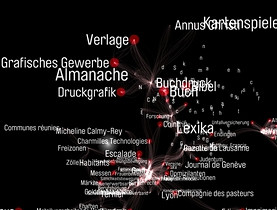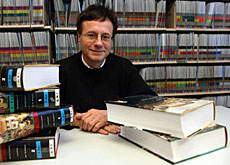Today’s news rooted in records from recent past

Banking secrecy and the country's tax policy were also concerns in Swiss international relations in the 1960s, as diplomatic documents show.
The latest volume in a series of foreign policy files from the time has been published, and the contents should be of interest to a wider public, argue the editors.
“The topics of the early 1960s are issues that still make today’s headlines,” says Hans-Ulrich Jost, president of the research group’s editorial commission.
The retired history professor dismisses suggestions that the publication of key diplomatic documents is primarily intended for academics and students.
One report by the Swiss ambassador to Washington follows an informal conversation with a security advisor to President John F. Kennedy. The official, McGeorge Bundy, reportedly hinted that the United States government was concerned about Swiss banks accepting what was described as “dirty money”.
“This documents from 1962 show the core of a problem which has led to today’s disaster about banking secrecy,” says Jost. “It is an example of how these files can also take non-historians on a trip into the past and confront us with relevant political issues of today.”
Other examples cited in the volume highlight the beginning of Swiss interest in European integration, the immigration of foreign labour, relations with international organisations, including the United Nations or the debate over whether Switzerland’s armed forces should be equipped with nuclear weapons.
“Reading some of documents you realise the Swiss perception has not changed much since. It is almost as if the texts were written today.”
Jost said he found passages in the files which made him want to take out his marker and highlight the words, notably on a request for financial aid by the UN to help the conflict in the breakaway Nigerian republic of Biafra.
“A document from a cabinet meeting reveals a very low, almost nasty opinion of the UN. The Swiss attitude was also clearly that they are not giving anything if they don’t get anything back in return.”
“Appetisers for the mind”
Volume 22 of the Diplomatic Documents uses a thematic approach focusing on seven main themes of 1961 to 1963. It is complemented by additional documents accessible online.
Andreas Kellerhals, director of the Federal Archives, stresses the importance of extending access to the diplomatic files both for researchers abroad and a wider public in Switzerland.
“They are only a small selection of the files stored in archives but they are like appetisers for the mind.”
Nearly 500 key files are in the printed version, while another 150 are accessible over the internet.
“The online offer allows us to reach out to an audience which normally cannot come to the Federal Archives in Bern to consult the files,” says Kellerhals.
There is considerable interest in Swiss foreign policy from researchers in France, and Germany, but also from Britain and even the US and Canada.
Technical upgrades of the system are underway to further ease the handling of the database in the future, according to research director Sacha Zala.
The research team also hopes the series will contribute to breaking the political and academic isolation of Switzerland.
Future insight
Just how inspiring the historical documents are for specialists was proven during a recent presentation of the volume by Antoine Fleury, who was in charge of the research project until 2008.
The retired professor of history at Geneva University launched into a colourful lecture on Switzerland in the early 1960s.
Foreign Minister Friedrich Traugott Wahlen and Hans Schaffner, as economics minister, helped shape Switzerland’s international relations in these years, including development cooperation on a bilateral rather than multilateral basis.
Fleury also pointed out that Swiss tax policies were mentioned in a document by the US administration about fiscal reform plans.
“The Swiss federal authorities used the opportunity to put pressure on the cantons to harmonise their fiscal rates”, as he added with a quick smile.
However, there are no lessons to be learned from history, says his colleague Jost.
“History does not repeat itself, but it grants us an insight into long-term political and social developments,” Jost says.
“History helps us understand how things have come about. It might encourage us to look into the future and consider possible options for our actions.”
Urs Geiser, swissinfo.ch
Volume 22 of the Swiss Diplomatic Documents covers the years 1961-63.
It contains nearly 500 printed files and additional 150 documents accessible over the internet.
The research project, which was launched in 1973, deals with the post-war years and includes about 8,000 electronic files.
The project is funded by the Academy of Humanities and Social Sciences and the foreign ministry, and has the backing of the Federal Archives.
Official documents in Switzerland are banned from publication for at least 30 years. The research group says it hopes to bring the publications as close as possible to the limit.

In compliance with the JTI standards
More: SWI swissinfo.ch certified by the Journalism Trust Initiative













You can find an overview of ongoing debates with our journalists here . Please join us!
If you want to start a conversation about a topic raised in this article or want to report factual errors, email us at english@swissinfo.ch.